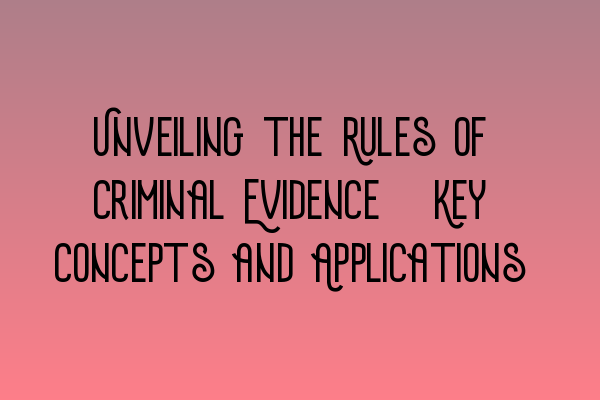Unveiling the Rules of Criminal Evidence: Key Concepts and Applications
Welcome to SQE Criminal Law & Practice Law UK, where we strive to provide you with valuable insights and expertise in the field of criminal law. In this blog post, we will delve into the intricacies of criminal evidence, exploring key concepts and their practical applications.
Before we begin, it’s essential to have a solid understanding of criminal evidence. The admissibility and reliability of evidence play a crucial role in determining the outcome of a criminal case. In order to protect the rights of both the defendant and the prosecution, a set of rules and procedures has been established to guide the handling and presentation of evidence in court.
The Basic Principles of Evidence
When it comes to criminal evidence, certain fundamental principles govern its admissibility:
- Relevance: Evidence must be relevant to the case at hand. Irrelevant evidence can be excluded, as it can unduly influence the jury and waste valuable court time. It is crucial for solicitors to carefully select and present evidence that directly supports their arguments.
- Reliability: The reliability of evidence is of utmost importance. This is particularly relevant when dealing with expert witnesses who provide specialized knowledge in a specific field. Ensuring that experts are qualified and their methodologies are scientifically sound is crucial in upholding the integrity of the evidence presented.
- Hearsay: Hearsay evidence refers to statements made by individuals who are not present in court to testify. Generally, hearsay evidence is deemed unreliable, as the declarant cannot be cross-examined. However, there are exceptions to this rule, such as dying declarations or statements made against the declarant’s interest.
- Privilege: Some types of evidence are considered privileged and cannot be compelled to be disclosed in court. Examples include attorney-client privilege and spousal privilege. It is crucial for solicitors to be aware of these privileges and their impact on the case.
Applications of Criminal Evidence Rules
Now that we have familiarized ourselves with the basic principles of criminal evidence, let’s explore their applications in real-life scenarios:
1. Direct and Circumstantial Evidence
In criminal cases, evidence can be classified into two broad categories: direct and circumstantial evidence. Direct evidence directly proves a fact in question, such as an eyewitness account or video footage. On the other hand, circumstantial evidence relies on inferences drawn from a set of circumstances. It is essential for solicitors to strategically use both types of evidence to build a strong case.
2. Expert Witnesses and Scientific Evidence
Expert witnesses play a crucial role in presenting scientific evidence and providing specialized knowledge to the court. Whether it’s DNA analysis, ballistics, or forensic psychology, expert witnesses provide an objective and educated opinion on matters beyond the understanding of the average juror. Solicitors must carefully select and prepare their expert witnesses to ensure their credibility and enhance the impact of scientific evidence.
3. Chain of Custody and Authentication
Chain of custody refers to the chronological documentation of the handling of evidence from the time it is collected until it is presented in court. Maintaining an unbroken chain of custody is crucial to establish the authenticity and reliability of the evidence. Solicitors need to ensure that proper procedures are followed to prevent tampering or contamination of evidence, as any lapse in the chain of custody can have significant implications on the admissibility of evidence.
Conclusion
Understanding the rules and concepts surrounding criminal evidence is fundamental for solicitors practicing in the criminal law field. By comprehensively exploring the principles of relevance, reliability, hearsay, and privilege, solicitors can effectively navigate the complexities of evidence admissibility.
For further reading on related topics, we recommend checking out the following articles:
- Demystifying the Solicitors Qualifying Examination Format
- LLC Formation Made Simple: Step-by-Step Guide for UK Entrepreneurs
- Business Regulations in the UK: A Comprehensive Overview
- Preparing for the SQE Exam: Strategies and Resources for Success
- SQE Workshops and Webinars: Accelerate Your Exam Preparation
We hope this blog post has shed light on the key concepts and applications of criminal evidence. Should you require further assistance or legal advice, feel free to contact SQE Criminal Law & Practice Law UK. Stay tuned for more valuable insights on criminal law!
